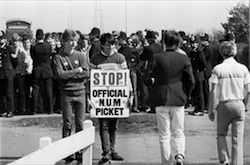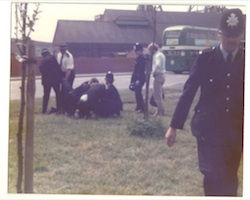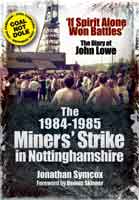John Lowe recorded everything that happened to him and his Nottinghamshire NUM comrades during the 1984-5 miners’ strike. His grandson, JONATHAN SYMCOX, who edited the newly published diary, recalls a man transformed by the dispute.
John Lowe of Clipstone in Nottinghamshire was just another breadwinner, an ageing father of five who had worked as a miner from the age of 14.
He was off sick in spring 1984 when the National Coal Board and Margaret Thatcher’s Conservative government put into motion their long-prepared pit closure programme. The miners’ strike for jobs erupted almost overnight and John, stuck at home, found his conscience tearing him apart.
The opinion of his wife Elsie was unequivocal: “You need to come off the club (sick leave) and get on strike.”
The proudest and most damaging year of his life began with the April monthly branch meeting, held the next day at the miners’ welfare.
“Twelve Derbyshire lads were outside lobbying,” he wrote on that day. “At one point I stood and asked just how much we were prepared to take, or if we were going to stand up and fight the closure programme.
“My final words were, ‘If there are any men left here with red blood in their veins, they’ll follow me outside now and stand beside those Derbyshire lads.’ The invitation was accepted by 50 men almost immediately.”
The following events were to transform him in both a political and emotional sense. He recorded everything that happened to him and his comrades in a diary, now published by Pen and Sword Books under the title If Spirit Alone Won Battles: The 1984-5 Miners’ Strike in Nottinghamshire.
The foreword is written by Labour MP Dennis Skinner, the famed ‘Beast of Bolsover’ and stalwart of the Left who recently quoted Only Fools and Horses’ Del Boy in labelling Prime Minister David Cameron a “plonker” in Parliament. He recalls knowing John as a young man in Clay Cross before encountering him again as an activist during the strike.
“Early in the dispute I did a big meeting at Worksop set up principally to galvanise the local NUM (National Union of Mineworkers) forces in Nottinghamshire,” writes Skinner.
“And there was John Lowe – and he wasn’t just a member of the crowd. He was asking questions, making speeches… I had to say to someone, ‘Is that the same fella?’ And the reply was ‘Yes’. It was a revelation to me.
“If I was to be asked whether people could turn into giants, politically and industrially, as a result of a battle with the management and the government and the police, I would put him in the top 10 of those people.”
‘Scab county’
Friends and family recall his firm and fair character, qualities he took into his union business after accepting the role of strike committee chairman and picket manager for Clipstone Colliery.
Appalled by the treatment of his beloved union and the portrayal of the miners in the media, John – in his fifties and suffering physically due to the decades spent underground – never wavered in the pursuit of his avowed duty to fight for the jobs of future generations.
He could never come to terms with Nottinghamshire’s historical reputation as ‘scab county’, one borne out in this most vicious and disgustingly political of industrial disputes, especially as this Yorkshireman born and bred had gifted almost his entire working life to it – and to Clipstone in particular.
“[Tonight I saw] the most disgraceful reaction that I have ever seen: when ‘Spencerism’ was mentioned as a danger, the result from the other side was one of cheers and shouts,” he wrote.
“When the break-up of the union was brought up, this was openly encouraged, again, to cheers. I felt physically sick.”
The majority of miners in Notts and other parts of the Midlands remained at work, as they had during the General Strike of 1926, when George Spence formed a breakaway mining union to circumvent the industrial action. In 1984-5 the strikers were therefore treated as lepers, whereas in other NUM areas, such as Yorkshire and Durham, the support for strike action was wall-to-wall.
Anne Scargill recently told me: “The strikers in Notts had it the hardest of anyone in the strike.”
These hardships extended beyond the bile spat in their direction by the ‘working miners’: the police harassed them day and night and failed to provide protection when they were targeted by their opponents; the court system, ostensibly in place to serve justice, sought only to criminalise them; and government departments deliberately blocked applications for financial and legal aid at all levels.
Much of what went on in the name of ‘law and order’ was illegal, although legislation rushed through Parliament quickly made it less so but all the more frightening for that. These lessons have had to be relearned again and again as successive administrations have disregarded and, at times, actively clamped down on working class and liberal-minded folk.
Destroyed faith
For John, the lesson was also learned the hard way – at the hands of police officers on the picket line.
“I stood my ground because of my intention to check the line, a regular practice I have followed right through the dispute,” he wrote. “A local constable was saying, ‘Mr Lowe, go back please’.
“I asked repeatedly what I was doing wrong and, if I was causing an obstruction, to tell me how and where. My questions were ignored while the officers continued to jostle me.
“I sat on the grass, telling them I was refusing to move; two grabbed me, one on each side, by the arms and pulled me to my feet.
“I pulled back and one of them must have lost his footing because the one to the left of me fell, pulling me down with him which in turn pulled the one on the right down on top of me.
“What followed then is something of a nightmare: I was conscious of at least three other officers on the floor holding me down; one said, ‘Put the handcuffs on him’, and I received a clip to the right side of my jaw followed by a forearm brought viciously down across my throat.”
Ultimately charged with obstruction and assault, John’s faith in law and order was destroyed forever. But despite this and the myriad difficulties, there were moments of hope.
As with the recent public sector action, support at grassroots for those involved was often unstinting and arrived from unexpected sources. Such generosity from sympathisers enabled the strikers to give their families a decent Christmas, for example, and reinvigorate their spirit at a time when they were most vulnerable.
“Time for the kids’ party finally came around and right from the start the place was bursting at the seams: not only the kids – around 90 – but mums, dads, grandparents and even the ones with no kids,” he wrote.
“Not for one moment did the tempo and enthusiasm slacken and I, for one, was completely knackered by the end. Maggie, you should have been there to see just how beaten we are!”
The hardest report
It was not to last. With the economy on its knees and the NCB belligerent in its demands of the strikers – openly hostile to them, even – the unthinkable nevertheless happened: areas of the NUM moved to return to work without agreement, but with their honour intact.
At the beginning of March, John’s diary was as important to him as ever before – in its role as an emotional outlet and record of events for posterity.
“This report is the hardest I’ve ever had to try and write. I feel so full of emotion – anger, frustration, shame, bewilderment. I’m finding great difficulty in putting my thoughts together,” were his words.
“Mid-afternoon the news came through that the [NUM delegates’] conference had decided narrowly, 98 to 91, that the strike was at an end. Although expected, it came as a body blow, well below the belt. My wife cried tears for me that I couldn’t cry for myself; they’ll probably come later.
“I feel so proud of her for the support she’s given in spite of all the difficulties and heartaches she’s suffered. When the history of this dispute is written, the Elsie Lowes of this world will surely stand out above everything: Thatcher pales into insignificance and will never bear mention in the same breath.”
‘General’ John Lowe died in 2005 as an NUM and working class hero to many. For decades after the dispute and subsequent collapse of his industry he remained committed to leftist politics, to his sacked comrades in the mining community and to those who showed ‘loyalty to the last’ in 1984-5, his home a shrine to these allegiances.
Mansfield MP Sir Alan Meale spoke movingly of his friend at the official launch of If Spirit Alone Won Battles in his constituency.
“John Lowe was a big, big man in Nottinghamshire,” he said. “He was one of three, in fact: there was John, Sid Richmond and Peter Harrison, the three musketeers. They were involved in everything – and John was in charge.
“He was decent, honourable, a trade unionist first and foremost and a community person. It’s an honour and privilege to remember him and I pray to God, if there is one, that we find another one or two like him in the remaining time that we are all left on this planet.
“Comrades, all we have to do is to try and follow the principles that this man had. He found them late in life but he lived them to the full and did so with a belief that we all have inside of us: that all we have to do is to try and do the right things.
“If you do the right things as often as you possibly can, then you are moving society forward and building a community worth living in.”
It’s a message to chime with today’s activists, and equally one alien to the cronyism inherent to the right and Cameron’s government.
—-
 The 1984/85 Miners’ Strike in Nottinghamshire: If Spirit Alone Won Battles: The Diary of John Lowe, by Jonathan Symcox, is published by Pen and Sword (£12.99).
The 1984/85 Miners’ Strike in Nottinghamshire: If Spirit Alone Won Battles: The Diary of John Lowe, by Jonathan Symcox, is published by Pen and Sword (£12.99).


